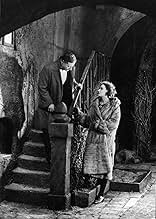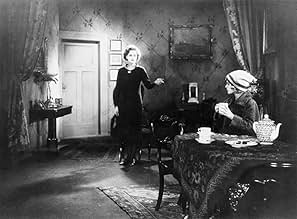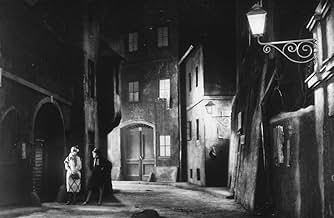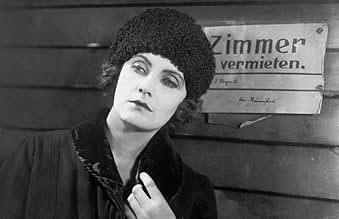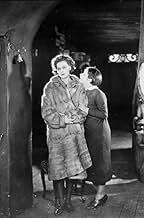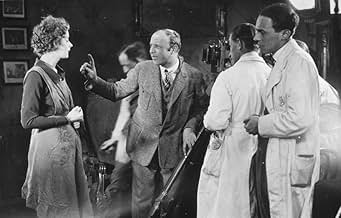NOTE IMDb
7,0/10
1,8 k
MA NOTE
Dans un bidonville à Vienne au lendemain de la première guerre mondiale, Lila Leid, l'épouse d'un avocat, est assassinée. La secrétaire d'un de ses clients est arrêtée. Il était avec elle et... Tout lireDans un bidonville à Vienne au lendemain de la première guerre mondiale, Lila Leid, l'épouse d'un avocat, est assassinée. La secrétaire d'un de ses clients est arrêtée. Il était avec elle et avait son collier, car il avait besoin d'argent.Dans un bidonville à Vienne au lendemain de la première guerre mondiale, Lila Leid, l'épouse d'un avocat, est assassinée. La secrétaire d'un de ses clients est arrêtée. Il était avec elle et avait son collier, car il avait besoin d'argent.
- Réalisation
- Scénario
- Casting principal
Ágnes Eszterházy
- Regina Rosenow
- (as Agnes Esterhazy)
Dorothea Thiele
- Lia Leid
- (as Tamara)
Renate Brausewetter
- Frau
- (non crédité)
Mario Cusmich
- Oberst Irving
- (non crédité)
Maria Forescu
- Frau
- (non crédité)
Robert Garrison
- Don Alfonso Canez
- (non crédité)
Valeska Gert
- Frau Greifer
- (non crédité)
Max Kohlhase
- Marias Vater
- (non crédité)
Krafft-Raschig
- Amerikanische Soldat
- (non crédité)
Avis à la une
As an entry into Weimar life, well Vienna, Austria, but it must have spoken to and about both places equally after the war, this opens a window in a time of hyperinflation and scarcity. And this is what I was looking for, direct experience from within the world that gives rise to it, as something that was about life "now".
We see on one hand the controllers, from the butcher that people line up to buy his precious meat, to the war profiteer who's come to run a scheme on the stockmarket, to the madame of a private club who exploits innocent desperation. All of them lecherous cutouts - but no doubt cut from life. Meanwhile around them dance and mingle various crowds of those who still have.
And on the other side the hapless schmucks dangling on strings of this cruel world being manipulated from above, the poor family downstairs, the girl whose father loses everything when the market tumbles and she's forced to entertain in the club, the unemployed couple who must live in someone's barn. The fancy rooms are closed to them, the streets they know bleak and ugly.
It is all here in a sense, however much schematic. Being a silent, the visceral impression is of a nightmare and reverie, something you'd want to wake up from - and yet the presentation of reality, within silent limits of the era of course, we would call realist, not expressionist.
And this is seen in another way. One of the things that first stirred in the murk of Weimar was film noir, not the actual thing but its ghostly progenitors. Mabuse would posit a bleak world much like we see here, inspired from the same dazed hopelessness no doubt, but a devious mastermind was behind it, the product of dazed imagination. There are devious minds here, but all of them ordinary schemers.
There's clear sight in other words. It was still too early in Pabst's career however and for where I know him to have gone with characters and story much like these, this seems like a modest beginning, a ground floor for future ones to be built on top.
We see on one hand the controllers, from the butcher that people line up to buy his precious meat, to the war profiteer who's come to run a scheme on the stockmarket, to the madame of a private club who exploits innocent desperation. All of them lecherous cutouts - but no doubt cut from life. Meanwhile around them dance and mingle various crowds of those who still have.
And on the other side the hapless schmucks dangling on strings of this cruel world being manipulated from above, the poor family downstairs, the girl whose father loses everything when the market tumbles and she's forced to entertain in the club, the unemployed couple who must live in someone's barn. The fancy rooms are closed to them, the streets they know bleak and ugly.
It is all here in a sense, however much schematic. Being a silent, the visceral impression is of a nightmare and reverie, something you'd want to wake up from - and yet the presentation of reality, within silent limits of the era of course, we would call realist, not expressionist.
And this is seen in another way. One of the things that first stirred in the murk of Weimar was film noir, not the actual thing but its ghostly progenitors. Mabuse would posit a bleak world much like we see here, inspired from the same dazed hopelessness no doubt, but a devious mastermind was behind it, the product of dazed imagination. There are devious minds here, but all of them ordinary schemers.
There's clear sight in other words. It was still too early in Pabst's career however and for where I know him to have gone with characters and story much like these, this seems like a modest beginning, a ground floor for future ones to be built on top.
In the post-WW1 in Vienna, a group of millionaires decide to manipulate the stock market with rumors to make it fall in the first moment and raise when people discover the truth. The ambitious Egon Stirner (Henry Stuart) loves Regina Rosenow (Agnes Esterhazy), who is the daughter of a wealthy man and she does not believe in his feelings. Egon has a love affair with Lia Leid, who is the wife of the wealthy Dr. Leid, and he asks if she may borrow some money to him to invest in the stock market. Meanwhile the secretary Marie (Asta Nielsen) has an unrequited love for Egon and decides to ask for a loan to Mrs. Greifer, who is the owner of a brothel in the poor Melchior Street, to give to Egon. The wealthy Don Alfonso Canez offers the amount to Marie and she goes to a room with him. When Lia is mysteriously murdered in a room in the same hotel, Marie falsely accuses Egon of killing her to Canez.
Meanwhile, the bureaucrat Hofrat Rumfort (Jaro Fürth) is not aware of the manipulation of the market and believes that is rich with the fall of the stocks and he spends a great amount. His daughter Greta (Greta Garbo) loses her job and they are forced to rent a room in their apartment to the Red Cross Lieutenant Davis (Einar Hanson) that pays a large amount to her. However she is forced use the money to pay the debts of her father. The only way to make money to feed the family is prostitution in Mrs. Greifer's brothel. What will be the fate of Greta?
"The Joyless Street" is a complex and melancholic story of a depressive period of history. The work of Georg Wilhelm Pabst is amazing since he is able to present a long feature (the edited version of 125 minutes running time) with many sub-plots and characters. This movie is also one of her first work of the gorgeous Greta Garbo that has a top-notch performance. My vote is eight.
Title (Brazil): "Rua das Lágrimas" ("Street of the Tears")
Meanwhile, the bureaucrat Hofrat Rumfort (Jaro Fürth) is not aware of the manipulation of the market and believes that is rich with the fall of the stocks and he spends a great amount. His daughter Greta (Greta Garbo) loses her job and they are forced to rent a room in their apartment to the Red Cross Lieutenant Davis (Einar Hanson) that pays a large amount to her. However she is forced use the money to pay the debts of her father. The only way to make money to feed the family is prostitution in Mrs. Greifer's brothel. What will be the fate of Greta?
"The Joyless Street" is a complex and melancholic story of a depressive period of history. The work of Georg Wilhelm Pabst is amazing since he is able to present a long feature (the edited version of 125 minutes running time) with many sub-plots and characters. This movie is also one of her first work of the gorgeous Greta Garbo that has a top-notch performance. My vote is eight.
Title (Brazil): "Rua das Lágrimas" ("Street of the Tears")
The interesting expressionist atmosphere and, most of all, a memorable performance by Greta Garbo (does she give any other kind?) both make "The Joyless Street" worthwhile. G.W. Pabst's style also makes a good combination with the setting in post-World War I Vienna. The supporting cast is also good, and all of this makes up for the lack of a first-class story.
Garbo is well-cast as the daughter who is the only real hope of an impoverished family trying to survive in a cold, unforgiving postwar city that is ruled by a handful of predatory exploiters. Just her eyes alone communicate volumes, and her character transcends the rest of the material. Pabst wisely included plenty of close-ups of Garbo, and these leave a lasting impression of her character's weary perseverance and strength of character.
Several of the other characters also have interesting stories of their own. There seem to be a number of different versions of the feature, with widely varying lengths, and thus with the story differently edited, so that some versions will work better than others. But regardless of the story, the setting is effectively rendered, and Garbo's performance stands out.
Garbo is well-cast as the daughter who is the only real hope of an impoverished family trying to survive in a cold, unforgiving postwar city that is ruled by a handful of predatory exploiters. Just her eyes alone communicate volumes, and her character transcends the rest of the material. Pabst wisely included plenty of close-ups of Garbo, and these leave a lasting impression of her character's weary perseverance and strength of character.
Several of the other characters also have interesting stories of their own. There seem to be a number of different versions of the feature, with widely varying lengths, and thus with the story differently edited, so that some versions will work better than others. But regardless of the story, the setting is effectively rendered, and Garbo's performance stands out.
For a long time "Die freudlose gasse" was not available in his "directors cut" form because all too explicit brothel scenes were deleted by censors. Only in 1997 a reconstruction took place. I saw the "full version". It is a good movie but above all the movie has special interest from the perspective of film history.
"Die freudlose gasse" forms a transition between the German expressionism and "die neue sachlichkeit / new objectivity". The skewed set pieces in the entrance to the nightclub of Frau Greifer reminds of German expressionism but the subject of the film is 100% new objectivity. No psychological themes such as in for example "Das Cabinet des Dr Caligari" (1920, Robert Wiene) but social engagement with the (very) poor in Vienna after the hyperinflation.
Some films emphasize the fate of the poor, for example "The grapes of wrath" (1940, John Ford). Some films emphasize the ruthlessness of the rich, for example "Wallstreet" (1987, Oliver Stone). In "Die freudlose gasse" Pabst emphasizes the contradiction between the rich and the poor. He does so by intelligent editing, and in so doing brings the theory of associative editing of Sergeij Eisenstein to the West.
There is not only a contradiction between rich and poor, but also a contradiction between poor and impoverished. After all this film is not situated after the stock market crash of 1929 but after the hyperinflation caused by (the piece treaty of) the First World War. This hyperinflation could make members of the middle class poor in only a few hours. Maria (played by Asta Nielsen) is a daughter of a poor family. Greta (played by Greta Garbo) is daughter of an impoverished family. Maria ends badly, Greta escapes the misery. Symbolically two big stars of Scandinavian cinema pass on the relay baton in this movie.
The most striking character of this film is however not played by either Asta Nielsen or Greta Garbo but by Valeska Gert as Frau Greifer. Her character is a sort of female Mephistopheles. She is both tailor and owner of a nightclub. As a tailor she sells expensive coats on credit. As the owner of the nightclub she coerces young girls to perform when they could not pay their debts.
"Die freudlose gasse" forms a transition between the German expressionism and "die neue sachlichkeit / new objectivity". The skewed set pieces in the entrance to the nightclub of Frau Greifer reminds of German expressionism but the subject of the film is 100% new objectivity. No psychological themes such as in for example "Das Cabinet des Dr Caligari" (1920, Robert Wiene) but social engagement with the (very) poor in Vienna after the hyperinflation.
Some films emphasize the fate of the poor, for example "The grapes of wrath" (1940, John Ford). Some films emphasize the ruthlessness of the rich, for example "Wallstreet" (1987, Oliver Stone). In "Die freudlose gasse" Pabst emphasizes the contradiction between the rich and the poor. He does so by intelligent editing, and in so doing brings the theory of associative editing of Sergeij Eisenstein to the West.
There is not only a contradiction between rich and poor, but also a contradiction between poor and impoverished. After all this film is not situated after the stock market crash of 1929 but after the hyperinflation caused by (the piece treaty of) the First World War. This hyperinflation could make members of the middle class poor in only a few hours. Maria (played by Asta Nielsen) is a daughter of a poor family. Greta (played by Greta Garbo) is daughter of an impoverished family. Maria ends badly, Greta escapes the misery. Symbolically two big stars of Scandinavian cinema pass on the relay baton in this movie.
The most striking character of this film is however not played by either Asta Nielsen or Greta Garbo but by Valeska Gert as Frau Greifer. Her character is a sort of female Mephistopheles. She is both tailor and owner of a nightclub. As a tailor she sells expensive coats on credit. As the owner of the nightclub she coerces young girls to perform when they could not pay their debts.
Director G.W. Pabst would later achieve considerable success with such films as PANDORA'S BOX and DIARY OF A LOST GIRL (both starring Louise Brooks), but while his earlier JOYLESS STREET is less sophisticated it is no less effective in its intense and gritty story of poverty and corruption in post-WWI Vienna.
Pabst was particularly noted for his realistic style, and the grainy, harsh look of the film serves well the story of a woman (the celebrated Asta Nielsen) driven to a life of prostitution and crime by her lover's betrayal. Today, however, the film is chiefly recalled as one of Greta Garbo's first major films, and although somewhat stiff, Garbo acquits herself very well in the role of a woman who contemplates prostitution in an effort to provide for her suddenly destitute family.
Considered scandalous at the time of its release, THE JOYLESS STREET was frequently cut for distribution--particularly in America. For many years the film existed only in edited form; the Kino video release, however, restores the film to its original form and length. Recommended.
Gary F. Taylor, aka GFT, Amazon Reviewer
Pabst was particularly noted for his realistic style, and the grainy, harsh look of the film serves well the story of a woman (the celebrated Asta Nielsen) driven to a life of prostitution and crime by her lover's betrayal. Today, however, the film is chiefly recalled as one of Greta Garbo's first major films, and although somewhat stiff, Garbo acquits herself very well in the role of a woman who contemplates prostitution in an effort to provide for her suddenly destitute family.
Considered scandalous at the time of its release, THE JOYLESS STREET was frequently cut for distribution--particularly in America. For many years the film existed only in edited form; the Kino video release, however, restores the film to its original form and length. Recommended.
Gary F. Taylor, aka GFT, Amazon Reviewer
Le saviez-vous
- AnecdotesThroughout her life, Asta Nielsen (Maria Lechner) always said that she failed to see the attraction and talent of Greta Garbo (Greta Rumfort).
- Versions alternativesIn 1997 the film was digitally remastered by the Filmmuseum Munich. It also got a new music score.
- ConnexionsEdited into Film ist a Girl & a Gun (2009)
Meilleurs choix
Connectez-vous pour évaluer et suivre la liste de favoris afin de recevoir des recommandations personnalisées
- How long is The Joyless Street?Alimenté par Alexa
Détails
- Durée
- 2h 5min(125 min)
- Couleur
- Mixage
- Rapport de forme
- 1.33 : 1
Contribuer à cette page
Suggérer une modification ou ajouter du contenu manquant

